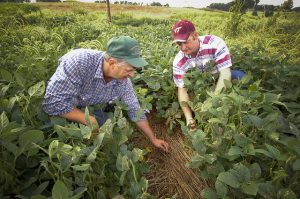Organic farming increases the amount of carbon in soil
 Photo credit: USDA
Photo credit: USDA
Accumulation of carbon in the soil is key to improving soil fertility and productivity. A recent study conducted by scientists at the University of Nebraska found that organic farming methods lead to higher levels of soil organic carbon (SOC) than conventional farming. Researchers collected soil data from long-term crop rotation experiments that had been ongoing for over 20 years. Comparisons included conventionally farmed plots, conventionally farmed plots that rotated different crops from season to season, an organic rotation that utilized alfalfa for fertility, and an organic rotation fertilized with cow manure. All of the organic plots showed higher levels of soil organic carbon than conventional plots, with the biggest difference observed in the organic plot fertilized with cow manure (19% more SOC than the conventionally farmed plot). “Our study, along with other similar studies on organic farming, appears to suggest that organic farming, for example with the application of green manure, could be one of the potential strategies to halt SOC losses and restore some of the SOC lost under conventional farming,”
researchers wrote.


